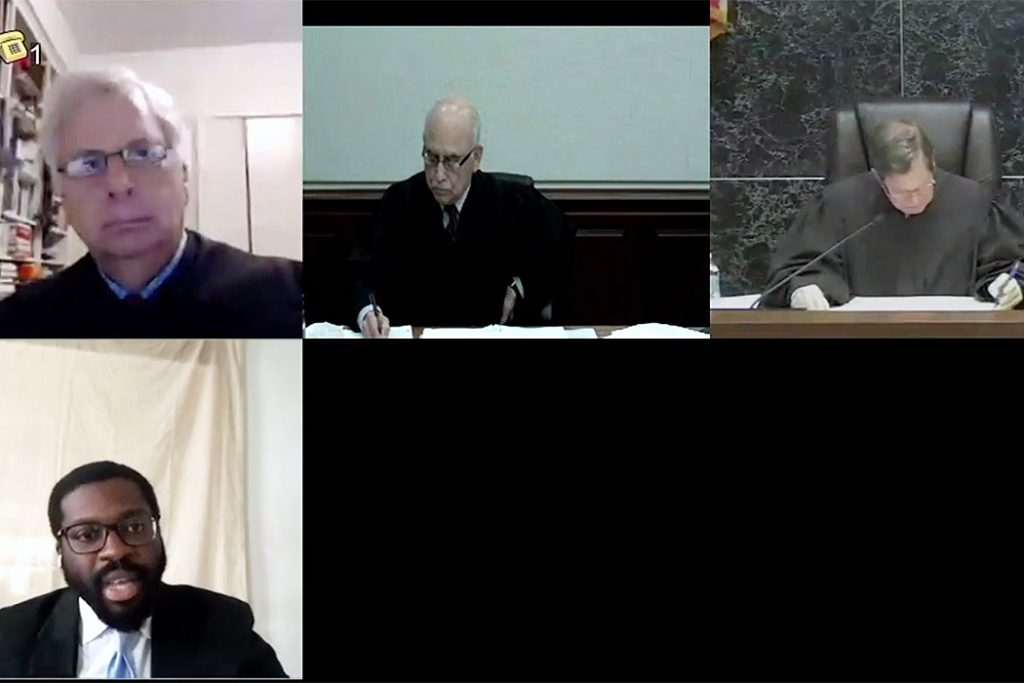Last week, Boston College Law students Kevin Collins ’20 (above, bottom left), Mary Lorenzo ’20, and Ezra Dunkle-Polier ’20 presented their oral argument to the Ninth Circuit Court of Appeals by video. The students were asking for their client, Kenia Martinez-Mejia, to receive protection from the Court through the legal remedies of withholding or protection against torture by the Convention Against Torture (CAT). (A video of their argument is here.)
Martinez-Mejia is from El Salvador and was physically and sexually abused by her father for more than 20 years. He tried to control every aspect of her life, from how she dressed and where she worked to whom she was going to marry. Martinez-Mejia repeatedly tried to leave him, but he blocked her at every turn. When she worked, he confiscated her money. When she went to school, he ensured she did not obtain ties that would facilitate her leaving him. When she physically moved to a different area of the country, he tracked her down and forcibly returned her to his home.
Finally, in 2016, she managed to leave her country, traveling by foot and car, to the United States border. In September that year Martinez-Mejia first tried to ask for asylum, but a border patrol officer conducted a short screening interview, believed she had no fear, and ordered her deported. The United States returned her to El Salvador.
Within weeks of that first deportation, criminal gangs raped her and demanded money. When she reported the rape, the police did not take the report. When she told them of the extortion, they advised her just to pay it. Country condition reports establish that the Salvadoran police are complicit with the criminal gangs, with many police forces either infiltrated or controlled by criminal gangs.
In December 2016 she escaped a second time to the US, was prosecuted for the misdemeanor crime of illegal entry (under then-Attorney General Jeff Sessions’ “zero tolerance” program), and was granted a full hearing before an immigration judge. The hearing took place in May 2018 with Shannon Johnson ’14, an attorney working for the Florence Project based in Arizona, representing her before the judge. The hearing did not end and was rescheduled to June. Before that next hearing, Attorney General Sessions issued a decision rewriting the old law to declare women fleeing domestic violence were no longer eligible for asylum, withholding, and CAT. The immigration judge in June ordered Martinez-Mejia deported, finding she was ineligible for any remedy.
The team of Kevin Collins ’20, Mary Lorenzo ’20, and Ezra Dunkle-Polier ’20 then presented a number of challenges to the deportation order. They argued that Attorney General Sessions’ new rule should not apply retroactively, that the immigration court erred by not recognizing that the Salvadoran police were complicit with the gang violence against Martinez-Mejia, and the particular social group “Salvadoran women” should be recognized as a means to protect Martinez-Mejia and others like her from harm.
As argued by Mary Lorenzo “this record shows how awkward and artificial it is to separate out and put different harms in different silos.” Under the remedy of CAT, only the rape by the gangs is legally relevant. Under the old rule overturned by Sessions, only the abuse by her father is legally relevant. “Recognizing Salvadoran women as a particular social group is the most intellectually honest and factually accurate way to describe what happened to Ms. Martinez,” Lorenzo said.
The students argued their case to Judge Richard Paez, Judge Richard Clifton, and sitting by designation, Judge Mark Douglas Harpool by remote technology. “The students were well-prepared and did a fantastic job in answering tough questions from the judges,” said Professor Kari Hong, who founded BC Law’s Ninth Circuit Appellate Program and supervises its law students. “Kevin was appearing from New York, Mary was appearing from Chicago, and Ezra was watching from Maryland,” she explained. “At one point, Kevin’s video feed cut out, but he quickly was able to resume a connection and kept arguing without missing a beat. Kevin was unflappable.”
This case presented important legal issues, and amicus briefs—known as friends of the court—were filed by the Center for Gender and Refugee Studies; retired immigration judges and dormer members of the Board of Immigration Appeals, represented by Texas A & M University School of Law (supervised by Professor Fatma Marouf); and the Harvard Immigration and Refugee Clinical Program (supervised by Professor Sabrineh Ardalan).
The Court will issue its decision anytime in the next year, usually within the next six months.
The students were prepared for oral argument due to the time and efforts of practitioners and alumni, including Sabrineh Ardalan, Karen Breda, Neela Chakravartula, Susan Church, Valentina de Fex ’17, Carlos Estrada, Mary Holper ’03, Brook Hopkins, Katie Horrigan ’16, Shannon Johnson ’14, Casey Riley ’15, Caryn Sigrudson ’15, Wagner Soto ’17, Heather Yountz.
The Ninth Circuit Appellate Project was founded in 2013. The Ninth Circuit schedules one case to be set to the academic school year. The clinic has presented 12 cases of which 8 have been granted and 5 have resulted in published decisions. A second case from the clinic will be argued remotely this May.
Photo, top row, let to right: Judge Clifton, Judge Paez,, Judge Harpool; bottom left: student Kevin Collins ’20.


